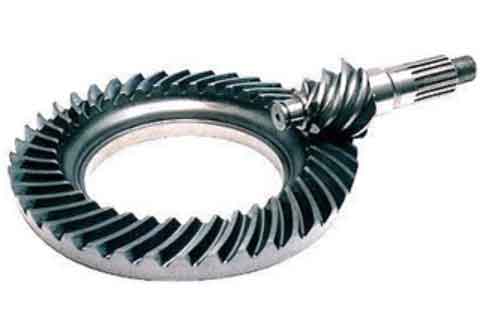Hypoid gears also find extensive use in marine propulsion systems, offering high efficiency and performance at sea. Here’s how hypoid gears contribute to the efficiency and performance of marine propulsion systems:

- Power transmission: Hypoid gears are commonly employed in marine propulsion systems to transfer power from the engine to the propeller. They efficiently transmit high torque and rotational power, enabling the propeller to generate thrust for propulsion. The offset design of hypoid gears helps maintain alignment and optimize power transfer, resulting in smooth and reliable performance.
- Compact design: Space optimization is crucial in marine propulsion systems, where engine rooms are often confined. Hypoid gears provide a compact solution, allowing the transmission system to be designed efficiently within the limited space available. Their compact design also helps reduce weight, enhancing the overall performance and maneuverability of the vessel.
- High torque capability: Marine propulsion systems require gears that can handle the high torque demands imposed by the propeller. Hypoid gears are well-suited for this task due to their ability to transmit high torque levels while maintaining durability. They offer excellent load-carrying capacity, ensuring reliable operation even under heavy loads and during maneuvering.
- Efficiency and fuel economy: Fuel efficiency is a critical consideration in marine applications. Hypoid gears have been optimized to minimize friction and improve gear meshing efficiency, resulting in reduced energy losses during power transmission. This helps maximize the overall efficiency of the propulsion system, contributing to improved fuel economy and lower operating costs.
- Noise and vibration reduction: Smooth and quiet operation is desirable in marine propulsion systems to enhance onboard comfort and minimize noise pollution. Hypoid gears, with their offset design and optimized tooth geometry, exhibit low noise and vibration characteristics. This is particularly important in passenger vessels and yachts where a quiet and comfortable environment is desired.
- Durability and reliability: Marine environments can be harsh, with exposure to saltwater, vibrations, and varying loads. Hypoid gears are known for their durability and ability to withstand demanding conditions. They are designed to resist wear, corrosion, and fatigue, ensuring reliable performance over extended periods of operation and reducing maintenance requirements.
- Flexibility in design: Hypoid gears offer design flexibility, allowing customization to meet the specific requirements of different marine propulsion systems. This includes adjusting gear ratios, incorporating multiple stages, and accommodating various power and torque specifications. This adaptability enables optimization for specific vessel types, such as recreational boats, commercial ships, or naval vessels.
Hypoid gears have proven to be efficient, reliable, and durable components in marine propulsion systems. Their ability to handle high torque loads, compact design, efficiency, noise reduction, and adaptability contribute to improved performance and overall operational effectiveness at sea.
